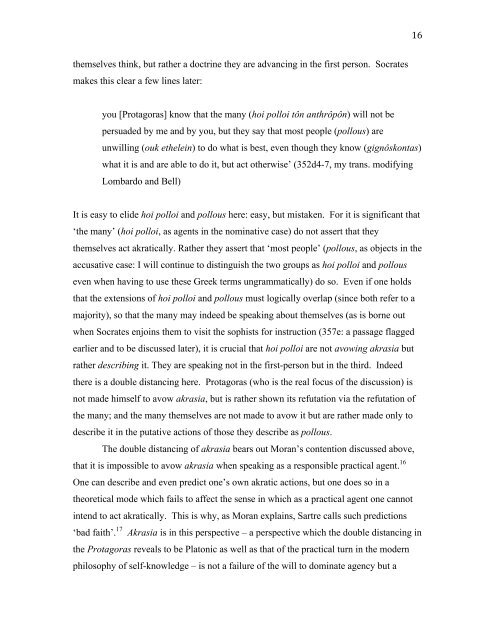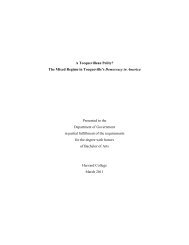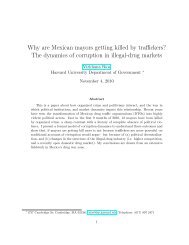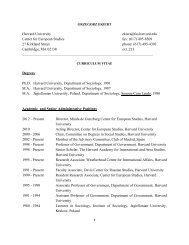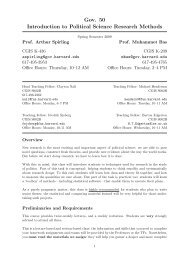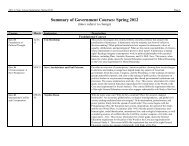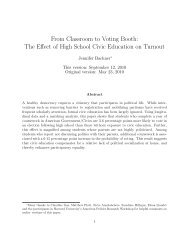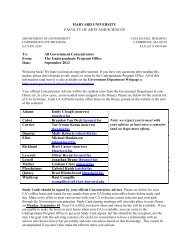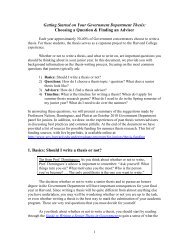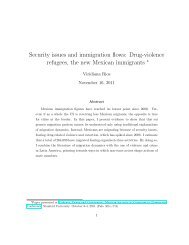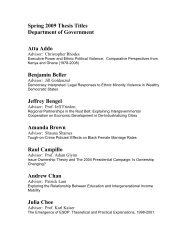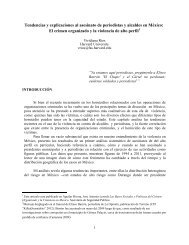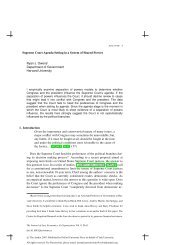1 Harvard University Political Theory Colloquium For 11 March 2010 ...
1 Harvard University Political Theory Colloquium For 11 March 2010 ...
1 Harvard University Political Theory Colloquium For 11 March 2010 ...
Create successful ePaper yourself
Turn your PDF publications into a flip-book with our unique Google optimized e-Paper software.
16 <br />
themselves think, but rather a doctrine they are advancing in the first person. Socrates<br />
makes this clear a few lines later:<br />
you [Protagoras] know that the many (hoi polloi tôn anthrôpôn) will not be<br />
persuaded by me and by you, but they say that most people (pollous) are<br />
unwilling (ouk ethelein) to do what is best, even though they know (gignôskontas)<br />
what it is and are able to do it, but act otherwise’ (352d4-7, my trans. modifying<br />
Lombardo and Bell)<br />
It is easy to elide hoi polloi and pollous here: easy, but mistaken. <strong>For</strong> it is significant that<br />
‘the many’ (hoi polloi, as agents in the nominative case) do not assert that they<br />
themselves act akratically. Rather they assert that ‘most people’ (pollous, as objects in the<br />
accusative case: I will continue to distinguish the two groups as hoi polloi and pollous<br />
even when having to use these Greek terms ungrammatically) do so. Even if one holds<br />
that the extensions of hoi polloi and pollous must logically overlap (since both refer to a<br />
majority), so that the many may indeed be speaking about themselves (as is borne out<br />
when Socrates enjoins them to visit the sophists for instruction (357e: a passage flagged<br />
earlier and to be discussed later), it is crucial that hoi polloi are not avowing akrasia but<br />
rather describing it. They are speaking not in the first-person but in the third. Indeed<br />
there is a double distancing here. Protagoras (who is the real focus of the discussion) is<br />
not made himself to avow akrasia, but is rather shown its refutation via the refutation of<br />
the many; and the many themselves are not made to avow it but are rather made only to<br />
describe it in the putative actions of those they describe as pollous.<br />
The double distancing of akrasia bears out Moran’s contention discussed above,<br />
that it is impossible to avow akrasia when speaking as a responsible practical agent. 16<br />
One can describe and even predict one’s own akratic actions, but one does so in a<br />
theoretical mode which fails to affect the sense in which as a practical agent one cannot<br />
intend to act akratically. This is why, as Moran explains, Sartre calls such predictions<br />
‘bad faith’. 17 Akrasia is in this perspective – a perspective which the double distancing in<br />
the Protagoras reveals to be Platonic as well as that of the practical turn in the modern<br />
philosophy of self-knowledge – is not a failure of the will to dominate agency but a


